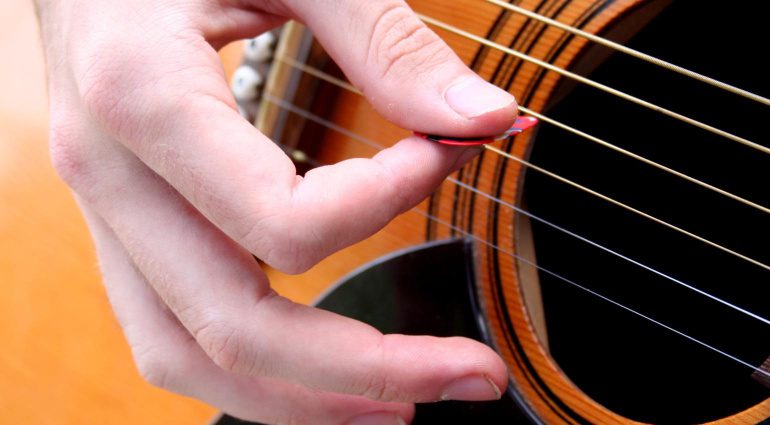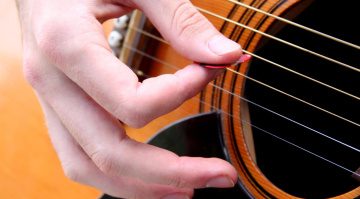Strumming patterns are your gateway into turning chord exercises into music! Why not try these 5 as a way to refine your skills?
Guitar Strumming Patters: What do you need to know?
Strumming patterns are the perfect way to take your playing up a level when you’re a beginner guitarist. Chances are, if you’ve already learnt a few chords, you could be lacking the glue that holds them together.
When looking at strumming on guitar, it can be useful to learn a few simple rhythms. Don’t worry! You won’t have to take a full course in standard notation. However, a basic understanding of note names and values will always help. You could check out our guide on rhythms just to get a head start.
Anyone here not already using a guitar pick? Well, for practising strumming patterns, they’re pretty much essential. Luckily, *Thomann have a wide range of guitar picks readily available. Regardless of size, shape, colour, thickness or brand, you’ll be covered.
Downward Strokes: Crotchets
To begin our look at guitar strumming patterns, we’ll start simple. Here, we’ll be looking at downstrokes in the form of crotchets. Otherwise known as quarter notes.
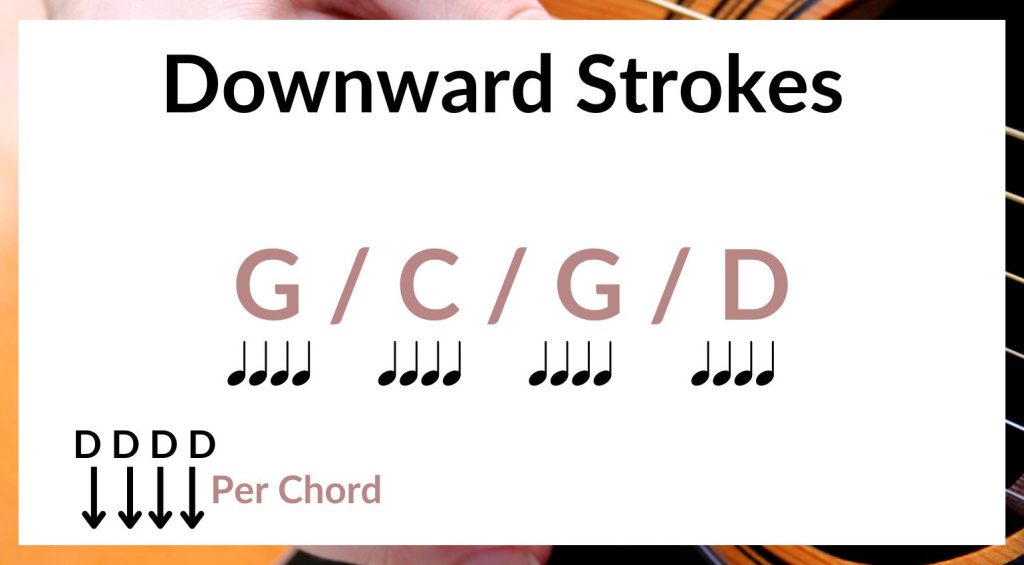
Every note in music has a rhythmic value, which tells the player how long to play that note for. Therefore, a crotchet makes up 1/4 of a bar, hence its name. In a 4/4 time signature, where we have four beats to a bar, we can only fit four crotchets within it.
So how does this help with our strumming patterns? Well, from an entry level perspective, we want to strike the strings with a downwards motion, four times across each bar. We can see from the photo that we want to play each of the four chords four times with a downwards strum.
Upward Strokes
Similarly, we can play the exact same rhythm but with upstrokes! The feeling and movement of the music would be the same, but all we’re changing is the direction of the picking hand.
By doing this, we’ll be getting used to changing the direction of your strumming hand. Why is this important? Because, ultimately, strumming patterns require both up and downstrokes.
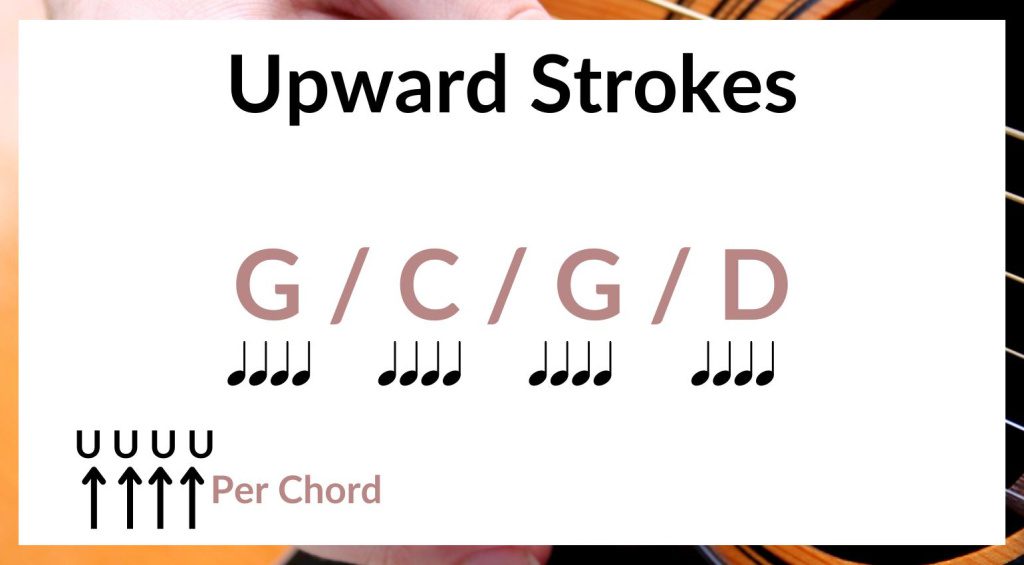
Down and Up: Quavers
Now that we’ve looked at down and up strumming separately, why not combine the two? Essentially, this will be our first look at a proper strumming pattern.
Although, there are plenty of songs out there that just use crotchet down or upstrokes as the song’s official strumming pattern. It all depends on style, genre and complexity.
This time we’re looking at quavers which are also referred to as half beats. So, two quaver 1/2 beats have the same value as one crotchet. Across an entire bar of quavers we’d still have four beats. We want to play this as down up, down up, down up, down up.
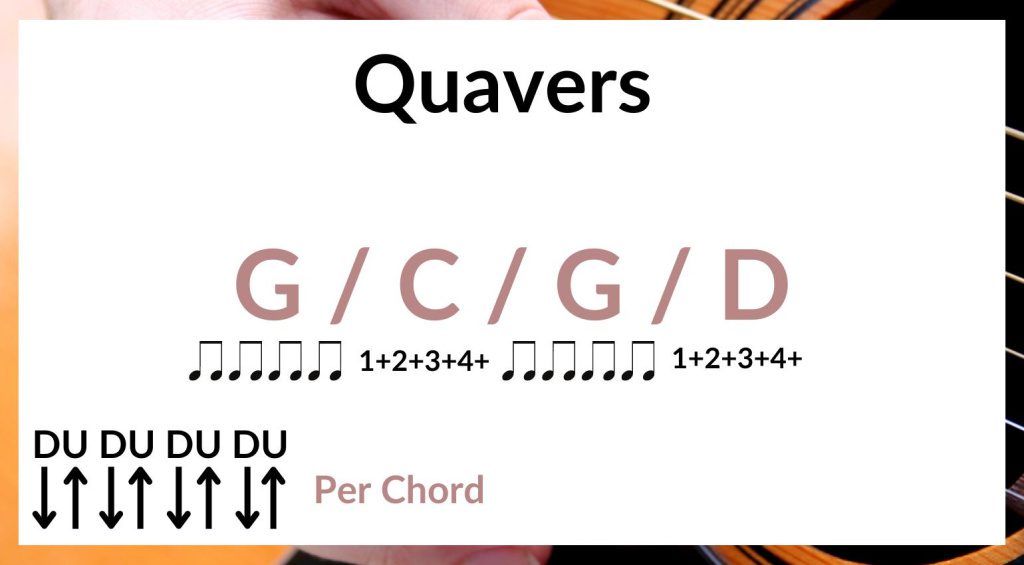
Quavers are a great way to speed up your playing. Most heavier genres of music use quavers to convey a fast paced feel. Here are a some examples of songs that have this strumming pattern:
Down Down, Down Up Down
Okay, so here is a great example to practise. This strumming pattern combines both down and up strokes. The difference here is that we don’t have an entire bar of quavers. Therefore it doesn’t feel rushed.
We’re working with a combination of crotchets and quavers, along with a rest too. Rests help to break up musical phrases and they have the same value as other notes. Whereby you could see a quaver or a crotchet rest.
I like to say the direction of my picking hand aloud when practsiing something such as this. With this example you would say, ‘Down Down, Down Up Down’. Notice the pause in the middle? This is to accommodate the rest. Rhythmically, we’ve got 1 2, rest, 3+4.
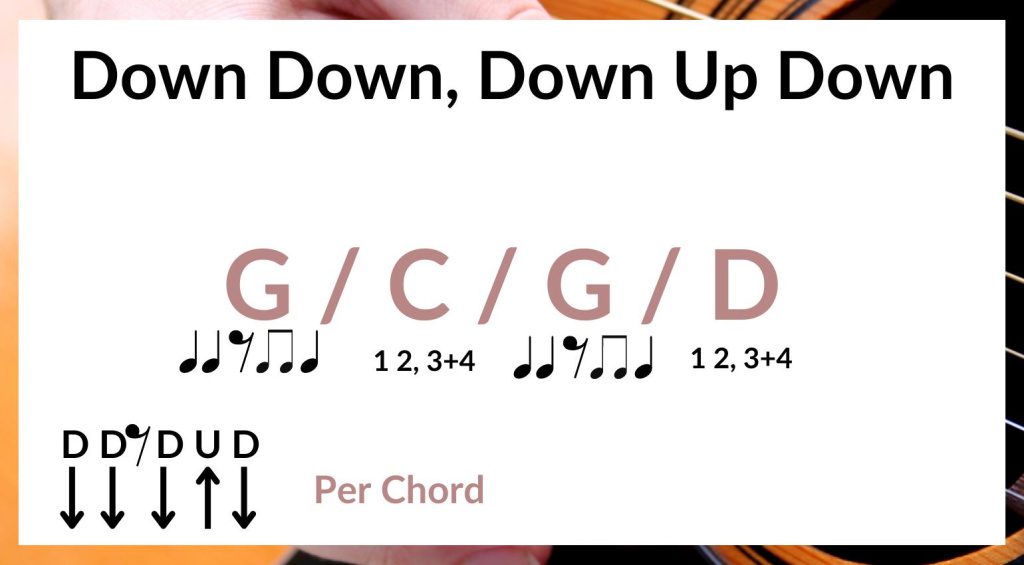
Down Down Up, Up Down Up
To conclude our look at essential strumming patterns, we’ve got potentially one of the most challenging strumming exercises as a beginner player. However, this strumming pattern will take you far!
Whereas before we only had one change of direction in the strumming hand, we’ve now got equal parts down and up in terms of strumming. The extra changes in direction can be deceptive in terms of how difficult they are.
Again, we’d say this aloud while strumming as guitar playing is a cognitive. With this example, the two sets of downs and ups are separated via a single quaver rest. Therefore, it’s important not to pause for too long.
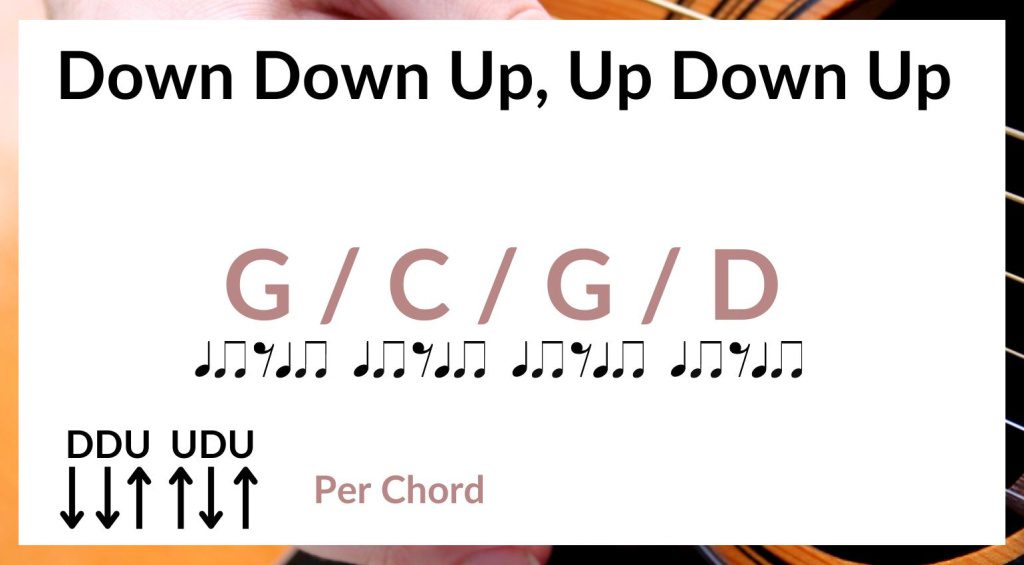
Relevant Examples
Zombie, by The Cranberries features the DUDUDUDU quaver strumming pattern that we looked at earlier.
Strumming patterns aren’t just for big acoustic open chords! Basket Case by Green Day features exclusively downstrokes across some distorted powerchords.
No One Knows also has a cool strumming pattern, similar to what we’ve looked at. The main theme works around a D DUD, D DUD. Overall, this gives the song it’s pulse.
Relevant Gear
Typically, you’d think of using an acoustic guitar for rehearsing strumming patterns. However, that doesn’t have to be the case.
Sure, a big dreadnought or jumbo acoustic are both great sounding guitars for campfire jams. However, the open twang of a Telecaster or the resonance of a Gretsch can also be great options.
Essential Guitar Strumming Patterns: Onwards and Upwards
There we have it, a look at 5 essential guitar strumming patterns. There are of course loads more to look at from across the musical spectrum. Although, if you get these ones nailed, you’ll be surprised how simple some of the others can be.
Videos:
Further Information:
*This post contains affiliate links and/or widgets. When you buy a product via our affiliate partner, we receive a small commission that helps support what we do. Don’t worry, you pay the same price. Thanks for your support!

